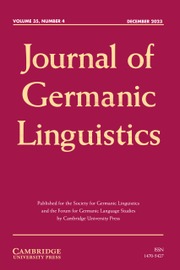Article contents
Post-Vernacular Language Use in a Low German Linguistic Community
Published online by Cambridge University Press: 01 June 2009
Abstract
In a time of rapid shift and loss of smaller, regional and minority languages it becomes apparent that many of them continue to play a role as post-vernacular varieties. As Shandler (2006) points out for Yiddish in the United States, some languages serve the purpose of identity building within a community even after they have ceased to be used as a vernacular for daily communication. This occurs according to Shandler through a number of cultural practices, such as amateur theatre, music and folklore, translation, attempts to learn the language in evening classes, etc. This paper demonstrates that the paradigm developed by Shandler for Yiddish can be applied to other linguistic communities, by comparing the post-vernacular use of Yiddish with Low German in Northern Germany. It focused on the linguistic strategies that individuals or groups of speakers apply in order to participate in a post-vernacular language community.
- Type
- ARTICLES
- Information
- Journal of Germanic Linguistics , Volume 21 , Issue 2: Special Issue in Honour of Martin Durrell , June 2009 , pp. 131 - 147
- Copyright
- Copyright © Society for Germanic Linguistics 2009
References
REFERENCES
- 10
- Cited by


